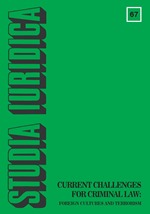ZASTĘPOWANIE DOMNIEMAŃ PRESUPOZYCYJNYCH ZWROTAMI KATEGORYCZNIE JEDNOZNACZNYMI W TEKŚCIE JURYDYCZNYM
REPLACING PRESUPOSITING CONJECTURES WITH RETURNS CATEGORICALLY EXPLICIT IN THE JURIDIC TEXT
Author(s): Jerzy J. KolarzowskiSubject(s): Law, Constitution, Jurisprudence
Published by: Wydawnictwa Uniwersytetu Warszawskiego
Keywords: presupozycja; zwroty kategoryczne; tekst jurydyczny; wypowiedź jurydyczna
Summary/Abstract: Out of the three functions of language, informative, ritual and persuasive, presupposition, in principle, belongs to the third. However, its persuasive force remains veiled, ‘hidden’ behind the external form of the verbal message. Therefore, in the linguistic form through ‘presumptions’ or pre-judgements, we shall comprehend such expressions and inividual utterances that result in receiving a hidden assumption message by our interlocutor or a partner in negotiations. This hidden assumption is thought to bring about a specific reaction, in their awareness, exerting a communicative and social influence, being at first unnoticed. This influence is at work when the sender (an inividual, a social group, or an institution) evokes, by means of communication, changes in people’s attitudes, their behaviour, thinking, motivations and emotions. Socio-linguistic research carried out in America on large populations show that in a longer period of time (a month or more), 50 per cent of our communication is of a social nature, 35 per cent is persuasive and only 15 per cent remains informative. Legislators, thus, deal with the last two types of communication not realizing the fact that, for many reasons of a psychological nature (mind sets), information is most difficult to assimilate when it comes to adressees of juridical communication. Problems that legal standardization requires are, therefore, most often expressed in the language of postulates, which revels in presuppositional reasoning. In a standardized legal text, one ought to avoid presuppositional expressions as they entail a broad scope of possible interpretation. Thus, the postulates replacing presuppositions with unequivocal expressions and propounds paradigms appropriate to this end.
Journal: Studia Iuridica
- Issue Year: 2006
- Issue No: 45
- Page Range: 103-117
- Page Count: 15
- Language: Polish

